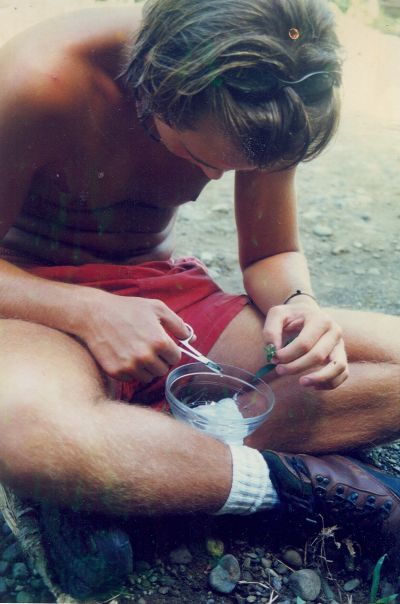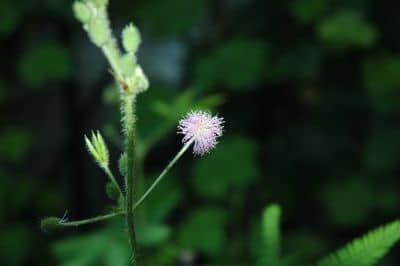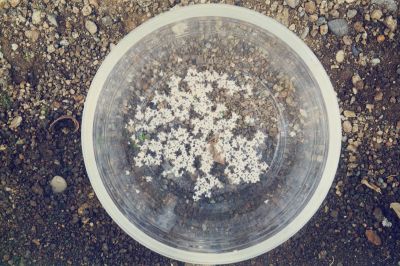First, I want to tell you how it actually came about that I started making remedies.
Herb-roer-me-not was the first of eventually a long series of remedies that Micha and I created without ever knowing that this wonderful work would ever come our way.
Below is a piece I wrote in my book "From Mother to Remedies", which I will rewrite in 2017.
On the platform of Central Station, a woman stood for months from May 1945, waiting and hoping to see if one more family member would return by one of the trains from the camps. She was heavily pregnant.
That woman was my mother...... and was pregnant with me.
Instead of throwing a big party for our 25th wedding anniversary (which I secretly dreamed of still wearing the wedding dress that day, which I never had), the three of us decided to go to Costa Rica. A party was going to cost a lot of money, it was the day before the Millennium, we didn't know if people really wanted to come, if they wouldn't have other commitments. The day after, most would also have another party. The great holiday we spent Costa Rica.
The piece of old pain that was still in my soul then, that I actually encountered in Costa Rica.
In every hotel we stayed in, we encountered large groups of Jewish people every time. And each time we were included in these groups with enormous love. What became clear to me, o....... how painful, this is something I would have liked so much to have had as a child. The children, who were in primary school with me, regularly went to stay with their grandparents or an aunt or they went to play with their cousins. I did not understand this, as I did not have grandparents or an aunt and uncle, let alone cousins. Many children from the neighbourhood were not allowed to play with us either, otherwise they would get "Jew tricks". What I did know was that my mother had a huge grief, but its magnitude was not clear to me. It was as if there was a kind of silence that I didn't know what to do with.
The warmth of these groups of people in Costa Rica touched my soul so deeply. When we had to say goodbye to the first group, Rob told me, he had rarely seen such pain in my eyes. How vulnerable I was!
I had this feeling the whole holiday and every day I was picking and fiddling with the Herb-roer-me-not. Everyone who wanted to hear and see it ( or maybe didn't want to hear and see it), e.g. while walking through the rainforest, I showed the little flower. Every time I touched the little plant, the leaves closed and then when I touched it again, the whole plant fell to the ground, as if dead. But to my surprise, after a few minutes the stalk came back up and then the petals opened again.
For hours I sat with this little plant. At the time, I had all the patience in the world. I had a deep sense of "humble". You could translate it as humility or meekness, but that is not the right translation for me. Perhaps the word "humble" is a better synonym for it.
At the end of the holidays came the day, I had to make this remedy! Now I know how tough this is! And yet had to it, it couldn't be otherwise! Could this be what Dr Bach meant, i.e. that you have to go through the negative state of mind every time before preparing a remedy? In the Netherlands, I made many people feel the remedy.......what turned out to be, for everyone it was a revelation the feelings the remedy evoked in them!!!!!!!!!
I felt protected by making this remedy. Felt protected from within. I also felt protected and supported by those around me. I was really a Herbal stir-me-not. So sensitive.
An important part of the Kruidje-roer-me-not is how she reacts to the environment. It could be that the environment (read people) reacts to Kruidje-roer-me-niet people. How many times do you hear...don't be silly...it's not that bad....you shouldn't react to this so much, because I don't mean anything by it......you need to get a little callus on your soul.....that's life.
Often as a result of shock or trauma, Herb stirring-me-not people become more sensitive and susceptible and threaten to "shut down" even before anything happens.
Looking at the difference between Star of Bethlehem and Herb-rock-me-not you can see that with the negative state of mind of Star of Bethlehem, "one" reacts as if the wound, upon the re-administration of a hurt or there being anything even remotely referring to a hurt, gets bigger and "one" experiences even more pain.

It looks like Herb-roer-me-not is even more sensitive.
Micha also made his first remedy there. They were such unsightly little flowers, which he cut off piece by piece, that he spent one hour cutting them alone. What this remedy does I don't know. It should not be used either.
For Micha, it has been the opening to "make remedies". I don't know what kind of flower it is. We never found out.
Dear Madeleine
Would like to let you know about my experiences with herb stir me not. Since a few days, I have been carrying the remedy with me. I have not taken it.
The first experience was tranquillity. As if everyone shut up for a moment. Lovely. It also gives firmness, more strength from within. Now I can experience what comes out of me. Only now I notice how many confusing impulses I picked up from the environment that I thought were mine. It doesn't reduce my sensitivity, but focusing is easier. Like a radio that now has a good antenna and can tune to a frequency without being bothered by jammers.
As a result, I no longer shut myself off from the outside world in advance. I can be open without the fear of being hurt. I no longer have to be constantly on my guard. Now I also notice how tired I actually am of being on alert all the time. It always seemed as if I needed many different blossom remedies and that this also changed very quickly. After one intake, it was often different again. Now I don't need any other remedy at all. Really enjoying it.
Thank you very much for making this remedy. Many other people will also enjoy this very much.
In recent years, a lot of scientific research has been done on high sensitivity. It showed that this is not 'something between the ears', but that the processing of stimuli in the brain is actually different in highly sensitive people. The Vrije Universiteit Brussel organised the first scientific congress last year, discussing the results of the studies. After alternative therapists, more and more general practitioners, psychiatrists and psychologists now recognise that high sensitivity exists. High sensitivity is not a disorder or condition, but a personality trait or character trait. About 20% of people are born with it.
Through this attention, high sensitivity gains recognition and can be increasingly used as a strength.
What does it mean to high-sensitivity to be?
A long list with the note that every person is unique and not everything applies to everyone!
I did not come up with the list below myself, but compiled it from many sources of information.
Because you know:
High sensitivity is your strength!
- HSPs are very aware of their thinking, feeling and acting. From all this awareness, they can become very tired. Thus, they are worse grounded and lose touch with their bodies and reality more easily. Quickly fatigued, quickly tired.
- Highly-sensitive people (HSP) absorb a lot of subtle information that other people are less likely to. One is more likely to be over-stimulated, resulting in feeling uncomfortable. As a result, one can be irritated earlier and the highly sensitive person is more likely to feel uncomfortable.
- A high-sensitive person is sensitive to stimuli from the environment. Flushing, trembling, a fast heartbeat, inability to think are examples of symptoms. Do not confuse it with anxiety or shyness.
- She/he finds it difficult to be watched, measured or evaluated. They then do not function for the full 100%.
- They are very good at caring and nurturing others. This is because they 'sense' the needs of others. However, they often forget to take good care of themselves. Their help often appears intrusive because they sense more than the person in question and who has not yet asked for help.
- They can make connections quickly through their strong intuition. These connections are often not understood by others.
- Many are creative, artistic, have a rich imagination , a great sense of beauty and have strong intuition.
- He/she needs philosophical, in-depth and spiritual conversations. However, they can also go overboard in this and then their conversations become 'floaty'.
- They have a better-developed 6th sense but are not necessarily psychic.
- She/he is less good at factual knowledge though they are usually good at languages and learning.
- Virtually all gifted people are HSP.
- He/she likes to retreat to a space that is safe for him/her, e.g. the bed.
- They quickly sense what the atmosphere is like. They want harmony and in an environment lacking that (businesslike, competitive or hostile) they function less well. When under stress and work pressure, they perform less.
- They often have low self-esteem because they were often rejected and experienced being 'different' from others.
- They seem shy, but they are not. On the contrary, they are very sociable. They are, however, very sensitive to the opinions of others. They experience these through detailed perception of body language which a non-HSP usually does not register or registers less.
- They can be in the middle of life. A prerequisite is that they feel secure.
- They have a big fantasy world. In this world, they create a lot. Actually going about shaping is usually a weaker trait.
- They are good at motivating and inspiring others. They are visionary and see possibilities from a very early stage, where it is not yet visible to others. In doing so, they may lose touch with their surroundings.
- There are no more boys or girls with high sensitivity.
- They are highly sensitive to physical or psychological pains in themselves or others.
- Highly Sensitive Children (HSK) do not like rough games and isolate themselves more easily.
- They want to be able to work and create from the heart. They then perform optimally.
- Many are perfectionists and they are afraid of making mistakes. The upside is that they are very careful and accurate and spot mistakes earlier.
- They follow rules more than others to avoid disapproval and comments.
- Interference factors from the environment are very strongly noticed. Unspoken negative feelings from others quickly upset them. Unkindness is also more likely to upset them.
- He/she is more likely to experience stress symptoms such as stomach aches, restless bowels, headaches, tingling nerves or an overall uneasy feeling.
- She/he can quickly 'deflate' in contact with other people.
- They have a great desire to be accepted for who they are.
- They are often 'unbounded', ( also called a large energy field or aura) and therefore extra sensitive to external stimuli. They find it difficult to recognise and indicate boundaries.
- They absorb a lot of external stimuli such as sounds, conversations, smells, busy streets, atmospheres, etc. This makes them tired faster.
- He/she thinks a lot (intelligence, reflection, brooding) and this takes a lot of energy.
- She/he is more likely to suffer from hay fever and/or eczema due to (over)sensitivity.
- They are better able than anyone else to listen to what is left unsaid in communication. Nuances of voice, sound, pitch and body language are easily perceived and this allows them to see through the other person (including social workers).
- Other people often feel comfortable with HSPs and share their problems with them. The downside is that the HSP empathises too much which causes them to give away their own power resulting in deflation and fatigue.
- He/she is more sensitive to stimulants such as e.g. drugs, caffeine, alcohol and often also to drugs and herbs (e.g. Ginseng)
- When an HSP commits to something, he also goes all the way for it.
- She/he is authentic and original. They have a wealth of plans and new ideas. However, when they have to function with fixed tasks and roles, they perform markedly less. They want everything too good, too deep and too perfect. The word 'too' is the biggest pitfall.
- He/she often takes an advisory role, such as writers, historians, philosophers, judges, artists, researchers, theologians, therapists and teachers.
- She/he is not the type for shifts or night shifts.
- They like peace and quiet.
- An HSP needs a lot of his own time. During this time, it is important for him to feed his soul. However, this does not make him selfish because it is precisely in this own time that he does a lot of work that ultimately benefits others.
- They are highly is allergic to everything that MUST. Obtaining planning and structure can be problematic. They are good at putting off 'must do' activities which can be detrimental to themselves.
- They also often do not know which feelings, emotions or physical complaints are their own or have been inherited from others.
- HSPs have a great sense of justice and a strong aversion to violence.
- HSPs include both tranquillity seekers and tension seekers. About 30% of HSPs are extroverts but easily overstimulated.
- Most people with eating disorders are highly sensitive.
- They have a deep connection with nature, the plant and animal world.
- For an HSP, Rest, Order and Regularity are important pillars to lead a balanced life.
- Many people with fatigue disease are highly sensitive
Madeleine Meuwessen
.
*Bloom remedies are no substitute for medication. Please note that in case of doubt you should always consult a doctor.


